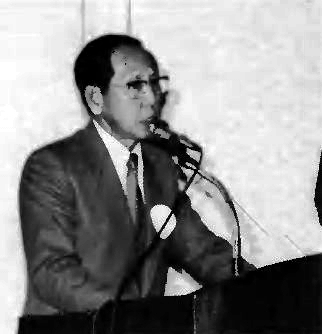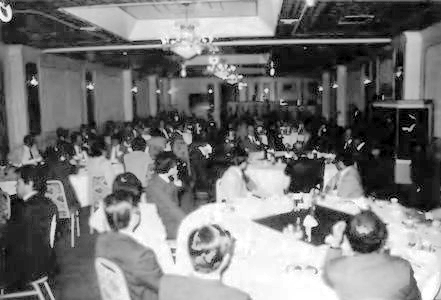![]()
The Words of the Chang Family
|
|
The Words of the Chang Family |

Recently the Professors World Peace Academy of Korea sponsored a series of seminars reporting on the current situation of Rev. Sun Myung Moon in Danbury prison. They were held in the seven biggest cities in Korea: Chungju, Jeonju, Pusan, Taegu, Kwangju, Jeju, and Seoul, from October 17 to October 27, 1984. Between 60 and 210 professors and VIPs attended each time.
At the beginning of each seminar Mr. Dong Moon Joo, secretary general of PWPA of Korea, explained the events that led up to the conviction of Rev. Moon during his stay in the United States, and the reasons that PWPA was sponsoring the seminars.
Three main lectures followed. The first was delivered by Dr. Hang Nyong Lee, president of PWPA of Korea, on the topic, "The Significance of the Conviction in Rev. Moon's Case in Light of the Current Situation in America"; the second was offered by Dr. Se Won Yoon, vice president, on the topic, "The Current Situation of Rev. Moon in Danbury and How He Copes With It"; and the third was given each time by a representative professor of each provincial branch of PWPA on the topic, "The Motivation to Join This Signature Campaign."
PWPA of Korea had a campaign from June 1 to June 20, 1984, to get signatures protesting the conviction of Rev. Moon and urging a reawakening of conscience in America. In all, 647 signatures were gathered for The Statement of Korean Intellectuals on the Tax Case of Rev. Sun Myung Moon: 537 from university professors, 16 from congressmen, 33 from attorneys, 14 from high school principals, and many from other VIPs. Many who attended the seminars also became signatories.
The following is a transcript of a speech given in Seoul on October 27 by Dr. Choong Shik Chang, president of Dankook University in Seoul.
My first meeting with Rev. Moon took place in 1982 when I was attending the ICUS conference being held in the United States. Before that, I knew nothing about the Unification Church and PWPA, nor did I even expect to meet Rev. Moon. What I knew at the time was only that ICUS had been sponsored and supported by the Unification Church and that in this academic conference many good topics were discussed among brilliant scholars from around the world. I participated in that conference to learn, merely as a member of the academic community.
When I expressed my intention to attend the conference to some senior professors at that time, I found to my surprise that there were quite a few who were against it. I know they were, because they worried about me.
What I felt from my first attendance at the conference was, "Why is this kind of conference being held by a religious leader?" The result of the meeting was not only exchanging academic views on the crossroads of religion and science, but also giving those many scientists from around the world a good understanding of the nation of Korea.
I began to think that if we love this country and if we care about our people then we'd better reconsider, even apart from a religious dimension, the real meaning of the conference. Thus, I came to know another aspect of Rev. Moon that I had been ignorant of.
Because I grew up in a Buddhist family and had had unfavorable experiences with Christian leaders, my interest in the conference was academic rather than religious. Like Rev. Moon, I came down to the South after 1946, leaving my hometown in the North where many of my relatives remained. Even so, there were many among my own family who were kidnapped by the North Koreans, and some of them suffered greatly at the hands of communists.
I know, of course, that there were many senior professors at the conference who had experienced the same kind of suffering. But faced with a real danger, a man can easily change his own principles. Indeed, we saw many cases, even among the senior professors who came down to the South during the Korean War, where they submitted to the communists just to stay alive.
I always think that I am a man who, under any circumstances; cannot help but fight against communism. I believe I have that destiny. So I've always been concerned about how to teach my children to prepare themselves for the possible outbreak of a miserable situation.
When terrible events happened, such as the kidnapping of the Pueblo and that barbarous act by the North on August 18, I summoned my only son and son- in-law and told them what to do if real war broke out. I said, "If you want to stay alive, it will require the deaths of your friends and relatives. You can't allow that. You and I have a relationship to God's providence. And if I told you to die in the battlefield because I'm your father, you might take me for one of the most immoral of fathers. But let's not just desire to remain alive. Let's choose to die beforehand with guns in our hands after sending your mother and sister to the rear." I then told them that there is just one decision to be made: "Fight to die." But while educating them like that, I often thought, "Can I really remain assured and stable in the face of real war?" I was even worried about the unthinkable possibility of my own conversion to communism under pressure. It was very difficult to have confidence in myself.
But my first meeting with Rev. Moon gave me the understanding that he was a man who had devoted his whole life to fighting against communism, and his standard was incomparable to that of anyone else. I felt that not only from his words but from his achievements throughout his life Therefore, if we do something to help him, we are serving not only Rev. Moon, but we are, also serving the fight against communism. It is our destiny.

Jean
Buk city seminar.
When I came back after my first participation in the ICUS conference, many people told me that I would have to resign my presidency because I had attended it. But later I joined PWPA, not because I made up my mind to do whatever Rev. Moon told me to do in the fight against communism, nor because I was recommended by PWPA to join. I made that decision myself because I wanted to offer even the smallest support for the members of PWPA who served my university. And if my university, my society, or my educational circles would not accept me on the grounds of my attendance there, then I would attribute it to my destiny. I was determined not to be a professor or president of my university who told a lie to maintain my post.
Frankly speaking, there were many professors before me who had attended the ICUS conferences in many places in the world. But there was none who told me about the character and contents of the conference, about what areas the conference dealt with, and about who provided the financial support.
Moreover, even I myself, who had been serving as president of a university for about ten years, didn't know what PWPA did, how it was formed, and what kind of members it had. I was then completely ignorant of those facts.
In retrospect, I know that there are many among the ICUS members who have suffered from persecution simply because they had joined activities supported by the Unification Church. I made up my mind to present myself before those professors and to endure whatever persecution I had to, if only I could be a help to PWPA's activities. If I had to resign my presidency on the grounds of my involvement, I would have been willing to do so.
One day I had an occasion to invite some of my university colleagues who were members of PWPA to dinner. Of course some professors attended, others did not. At that time I even heard that a few professors I had invited worried about why they were called to the dinner. I said then to the professors that I really had no intention of persecuting them, but that I wanted to act as a messenger who wanted to work for PWPA and their activities.
When I heard the news that Rev. Moon was supposed to go to court on charges of tax evasion, I thought that protesting against the unfairness of the trial would help not only him but also our security in Korea. So I took the lead in that protest. A few days ago I individually wrote a petition to President Reagan demanding the release of Rev. Moon. The answer arrived signed not by Mr. Reagan but by the first secretary of the U.S. Embassy stationed here in Korea.
When In Ho Kim, a Korean living in Japan, was imprisoned and sentenced to death in Japan, here in Korea there arose quite a strong movement from all over the country to save him. Even lawyers here and abroad came out and volunteered to plead for him, free of charge. And when a Korean living in San Francisco was suspected of murder and put into jail, the same thing happened here in Korea: there arose a large movement to try to save him.
Though I'm not a man with a good command of legal knowledge, it is conceivable that the U.S. government persecuted Rev. Moon because America's self-confidence was hurt by the spectacular growth that an Oriental gained in just one decade, by devoting himself completely to preaching activities and by undertaking many projects, especially in the field of news media and cultural enterprises.
I do not know fully about the background of Rev. Moon's hardships, but I think one of the reasons for his suffering is that we Koreans persecuted him too much. I believe he is very helpful to our country and people. I've met Rev. Moon only three times. But whenever I have met him, I could feel almost intuitively that he must be a man who can do the job of thousands.
Particularly when I visited The Washington Times office -- previously I had no regard for it -- I came to know about his motivation for founding the newspaper. And I was very proud to see the serious faces of those at the paper gathering around the table, and giving careful consideration to everything they do.
I found a noble will in Rev. Moon who believes the world can be one, and who tries to assuage the deep-rooted grudge in the hearts of the Korean people. Because of that, I, as a human being and a Korean, cannot help but pay tribute to him, even though we stand on different sides in terms of religion.
Do you still feel ashamed because you joined a conference sponsored by Rev. Moon? Are you still afraid to tell your feelings to your friends and relatives? I joined the signature campaign not because I tried to attain honor and distinction, and not because I was particularly indebted to Rev. Moon. I did so because I, as a Korean, felt that to help him would be to help my future and my children's future. With this pure motive I joined this campaign. I want to express my deep respect for those who supported the campaign. Thank you.